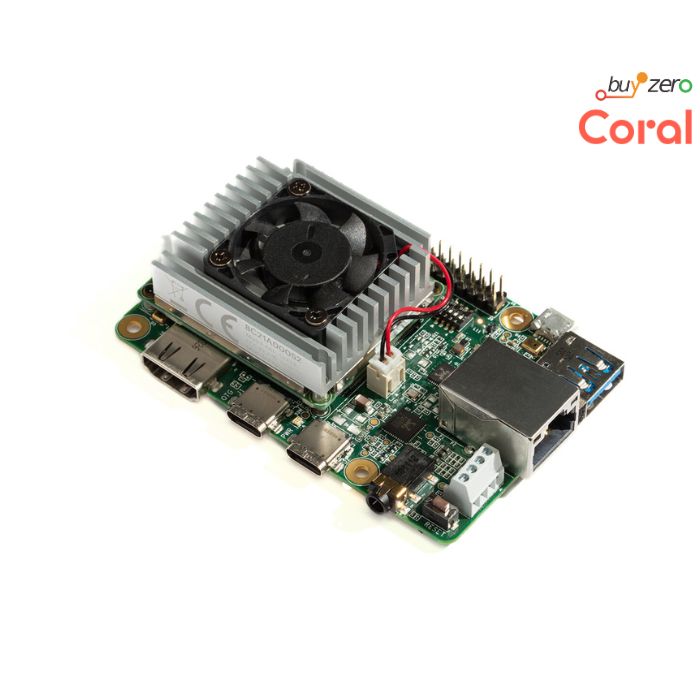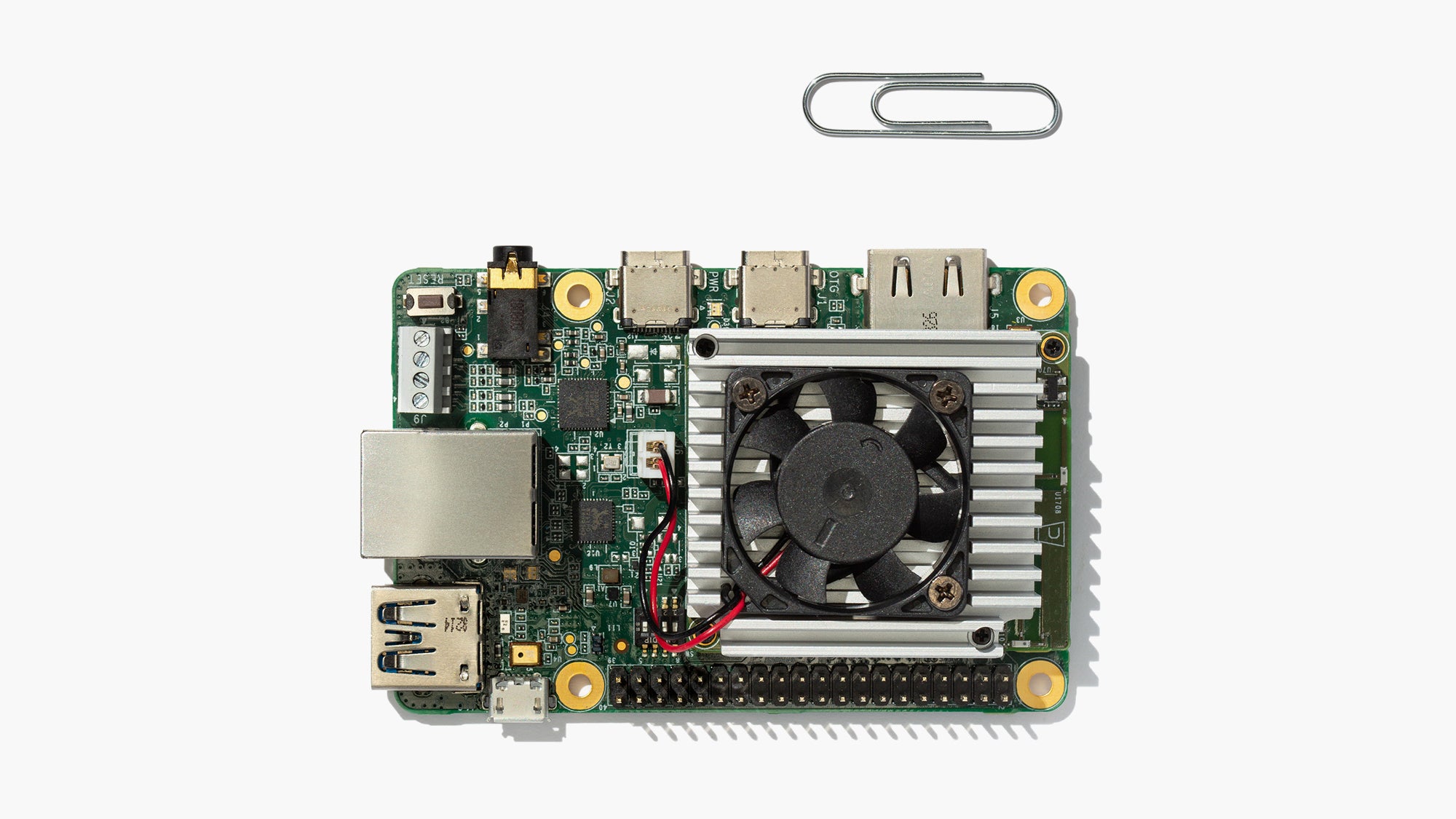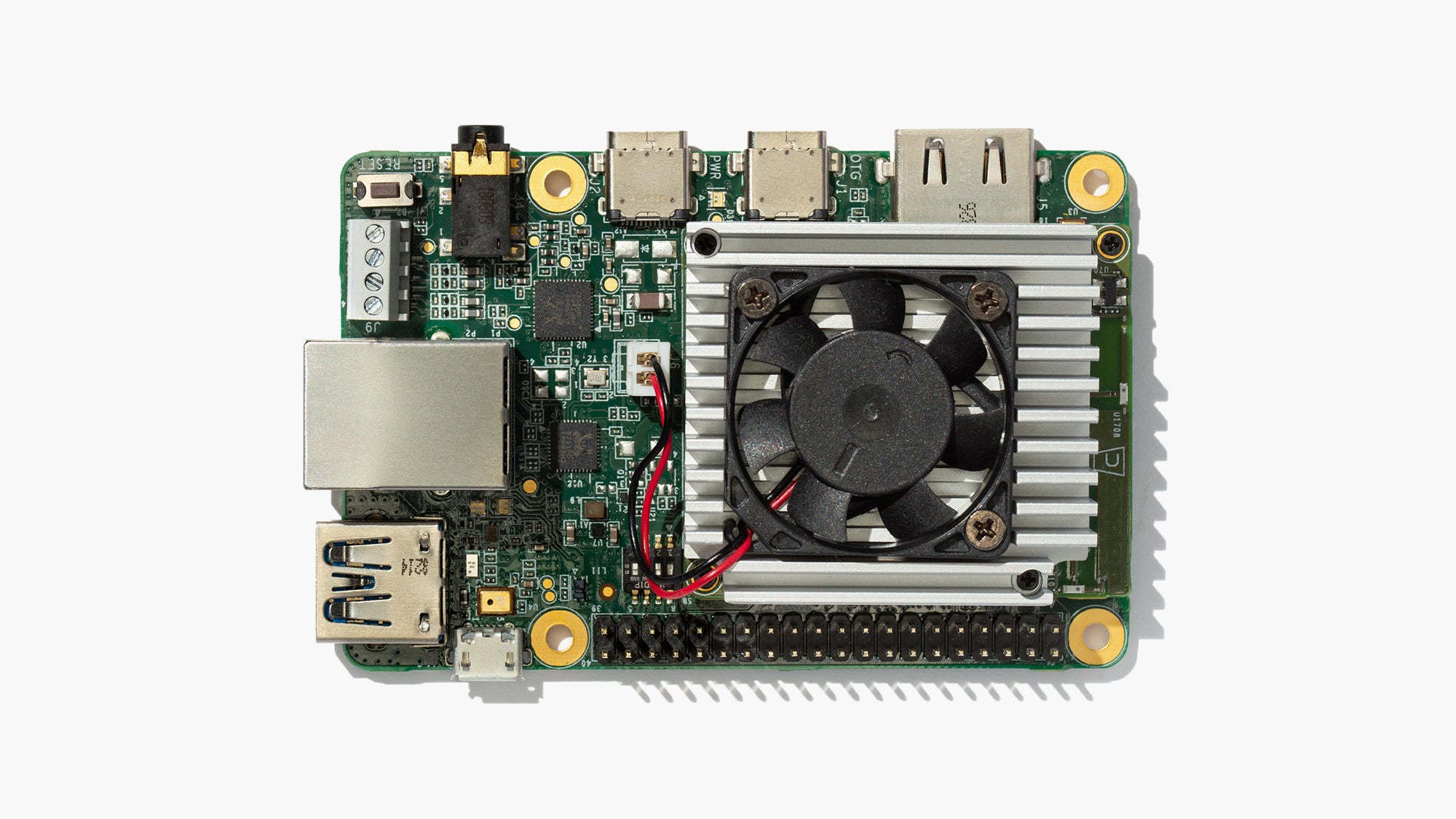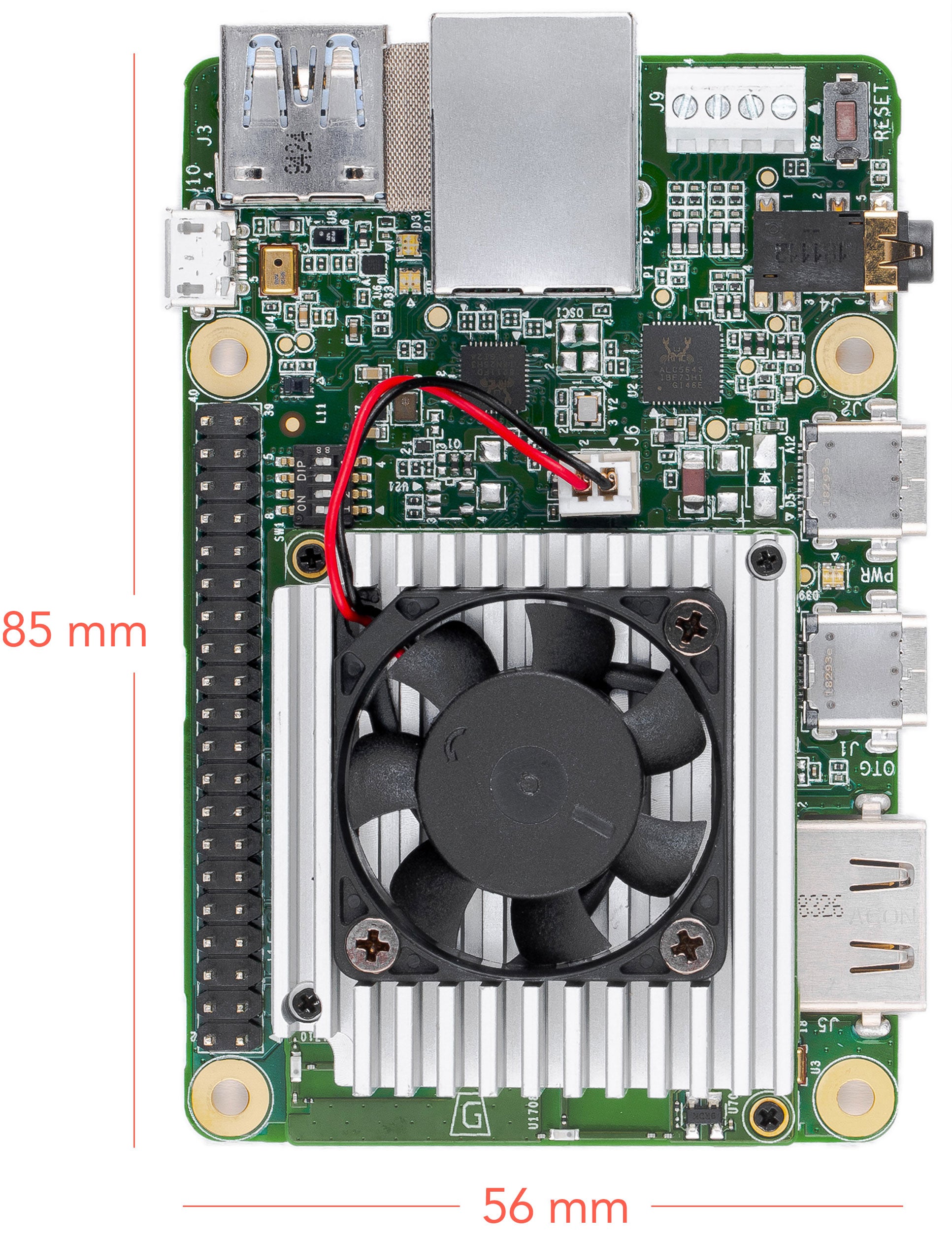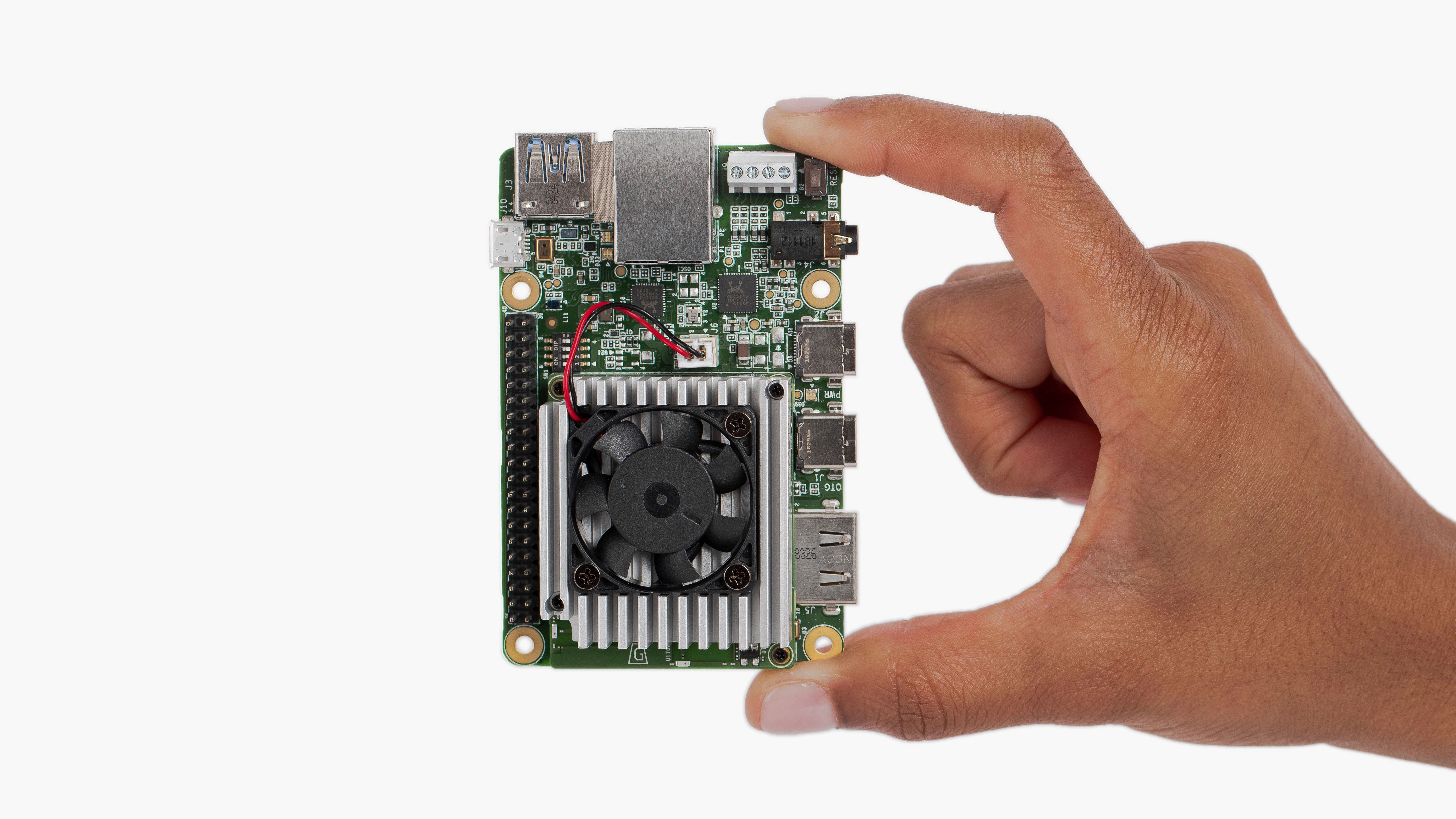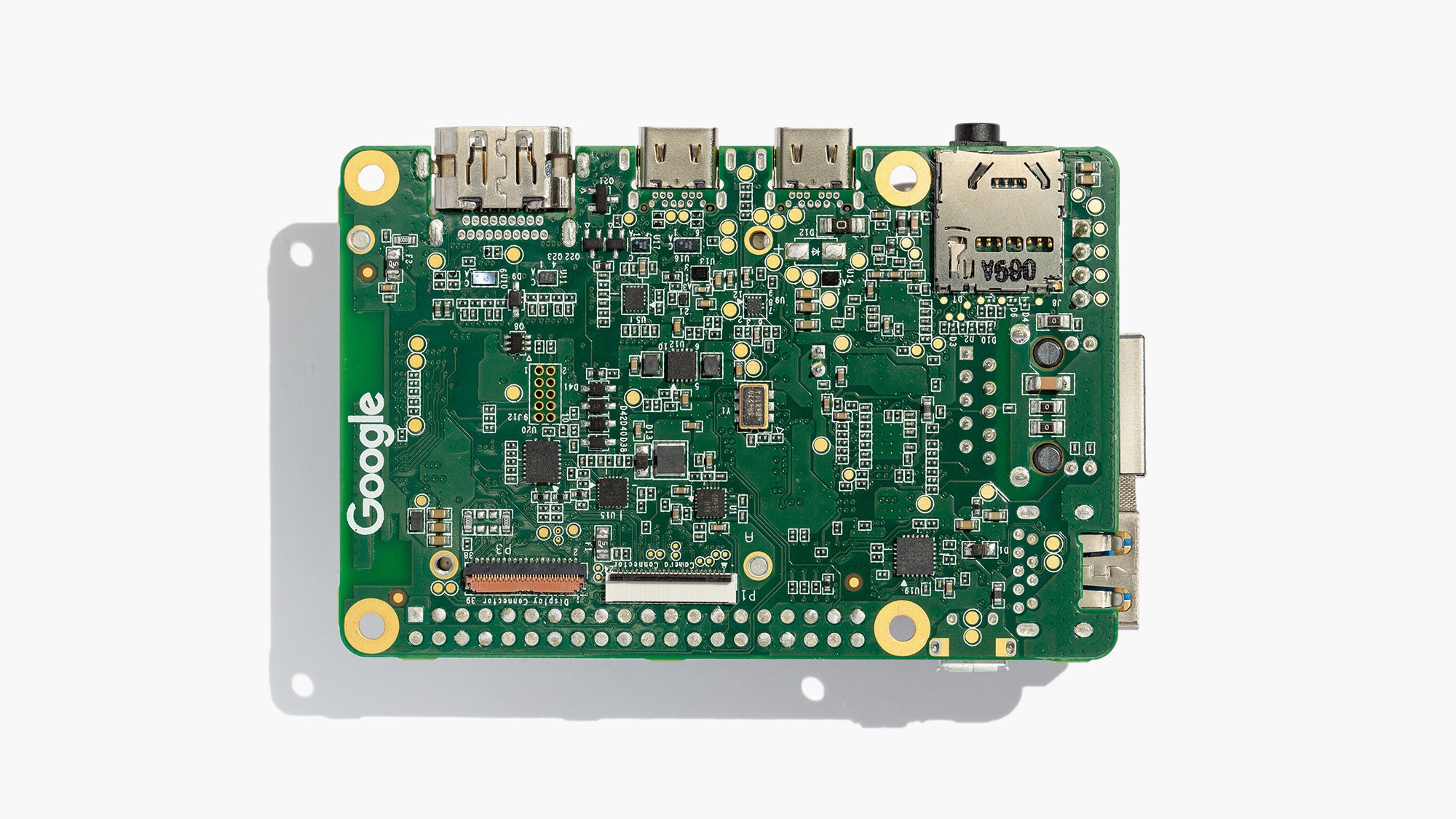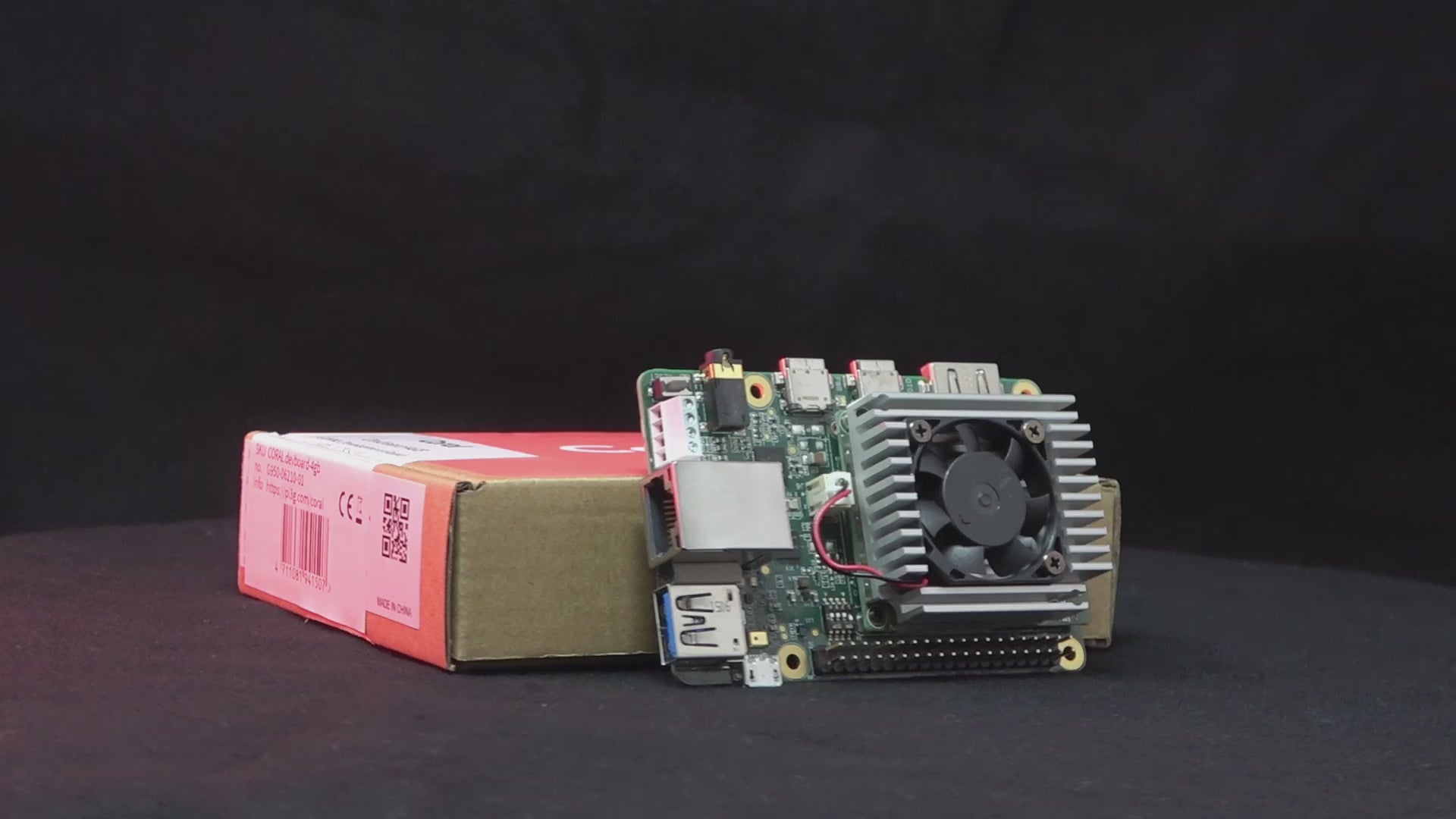Wir führen auch den Coral USB Accelerator, sowie das Coral Dev Board Mini. Für besonders hohe Leistung empfehlen wir das Coral Dev Board 1GB / 4 GB zu nutzen, während das Dev Board Mini vor allem für Low-Cost Lösungen sinnvoll ist.
Das Google Coral Dev Board 1GB / 4GB ist ein leistungsfähiger Single-Board Computer (SBC) mit eingebautem Real-Time Inferenz-Modul (Deep Learning / Machine Learning, EdgeTPU)!
Benötigen Sie ein Development Board mit integrierter TPU (Tensor Processing Unit) für leistungsfähige Machine-Learning / Deep-Learning Algorithmen? Das Google Coral Dev Board 1GB / 4GB ist besonders gut für mobilen / embedded Einsatz mit höheren Anforderungen an die Inferencing-Leistung geeignet. Wir beraten Sie gerne zu den verschiedenen Möglichkeiten, Machine Learning in Ihrem Unternehmen sinnvoll und günstig zu nutzen.
Coral SoM on-Board
Das Coral Dev 1GB / 4 GB ist ein Development Board auf Basis des Google Coral SoM (System-on-Module) mit 1GB bzw. 4GB RAM und 8GB bzw. 16GB eMMC Flash. Das besondere daran: das SoM enthält neben der EdgeTPU die wichtigsten Komponenten eines Einplatinen-Rechners (Single-Board-Computer / SBC). Es lässt sich damit perfekt in eigene Hardware-Designs integrieren!
Tipp: wir bieten Ihnen Hardware- und Softwaredesign aus einer Hand, rund um Coral sowie die Raspberry Pi Plattform. Nehmen Sie bei Interesse für ein unverbindliches und kostenfreies Erstgespräch bitte Kontakt mit uns auf.
Sie können somit im Prototyping-Stadium Ihre Anwendung mit Hilfe dieses 1GB / 4GB Coral Development Boards umsetzen, und anschließend einfach ein eigenes Hardware-Design realisieren. Oder setzen Sie bei kleineren Projekten das Coral Dev Board 1GB / 4GB direkt ein.
Im Gegensatz zum Coral USB Accelerator, ist dieses Development Board eine stand-alone Plattform, auf der Sie Ihre Anwendung komplett laufen lassen können.
Mit der Edge TPU können Tensor Flow Lite Modelle schnell und energiesparend für Inferenz genutzt werden.
Ein besonderer Vorteil dieser Lösung: Ihre Daten bleiben lokal. Das hilft bei der Latenz, und natürlich beim Datenschutz! (Und entsprechend der Befolgung der relevanten Gesetze, beispielsweise der Datenschutz-Grundverordnung (DSGVO), auf Englisch GDPR genannt)
Google nutzt zunehmend künstliche Intelligenz (AI) und maschinelles Lernen (ML) um seine Dienstleistungen zu realisieren. Dazu entwickelte es für seine Rechenzentren spezialisierte Prozessoren namens TPU ("tensor processing unit"), die die Algorithmen mit dem TensorFlow Framework schneller und energiesparender ausführen können. Beispielsweise wird Google Maps durch von Street View aufgenommene Straßenschilder verbessert, die mit Hilfe eines auf TensorFlow basierenden neuronalen Netzes analysiert werden. Der Clou: TensorFlow kann einfach in Python programmiert werden.
Die Edge TPU unterstützt das TensorFlow Lite Framework. Die Edge TPU kann bis zu 4 Billionen Rechenoperationen pro Sekunde mit nur 2 W Verbrauch durchführen. TensorFlow Lite ist eine abgewandelte Variante von TensorFlow, die speziell auf den Bedarf mobiler Endgeräte und von embedded devices angepasst wurde. Viele TensorFlow Anwendungen lassen sich auch in TensorFlow Lite realisieren.
Technische Daten Coral Dev Board 1GB / 4GB
SoM (System on Module)
- NXP i.MX 8M SoC
- Google Edge TPU ML accelerator coprocessor
- Wi-Fi 2x2 MIMO (802.11b/g/n/ac 2.4/5GHz)
- Bluetooth 4.2
- 8GB eMMC (1GB RAM Variante), oder 16GB eMMC (4GB RAM Variante)
- 1GB oder 4GB LPDDR4
- Rohm BD71837MWV PMIC (integriert 8 DC-DC Step-Down-Wandler, 7 LDOs)
NXP i.MX 8M SoC (Teil des SoM)
- Quad-Core ARM Cortex-A53 (@1.5 GHz, 64-bit ARMv8-A) + Cortex-M4F
- Vivante GC7000Lite GPU (supports Vulkan), 32 GFLOPs 32-bit or 64 GFLOPs 16-bit
- 4Kp60 HEVC/H.265 main und main 10 decoder
- 4Kp60 VP9, 4Kp30 AVC/H.264 decoder (benötigt volle Systemleistung)
- 1080p/60fps MPEG-2, MPEG-4, MJPEG, H.263 decoder
EdgeTPU (Teil des SoM)
- Google Edge TPU ML accelerator coprocessor
- 4 TOPS (int8); 2 TOPS pro Watt
- an NXP i.MX 8M SoC via PCIe und I2C/GPIO angebunden
Tipp: die Anbindung via PCIe ermöglicht die maximale Transferrate auf das EdgeTPU Modul, daher ist dieses Dev Board 1GB / 4GB insbesondere gut für Anwendungen mit hoher Framerate / hohen Leistungserfordernissen geeignet.
Hinweis: das SoM ist mit dem Development Board über drei 100-polige Steckverbinder verbunden. Es lässt sich abstecken, und beispielsweise in Ihrer eigenen Hardware integrieren.
Konnektivität & Schnittstellen
Das Coral Dev Board 1GB / 4GB verfügt über folgende Schnittstellen:
- Wi-Fi 2x2 MIMO (802.11a/b/g/n/ac 2.4/5GHz), Murata LBEE5U91CQ Modul
- Bluetooth 4.2 and BLE (Bluetooth Low Energy), Murata LBEE5U91CQ Modul
- 40-pin GPIO Header (3.3V Logiklevel) (siehe unten)
- USB 3.0 Typ-A Host
- USB Typ-C Daten (OTG-fähig)
- USB micro-B für die serielle Konsole
- microSD slot
- Gigabit Ethernet, unterstützt EEE (Energy Efficient Ethernet)
- HDMI 2.0a (volle Größe, siehe unten)
- 3.5 mm Audiobuchse
- 4-pin Stereo Anschluss-Terminal
- 2x Digitales PDM Mikrofon
- 39-pin Folienkabel (FFC) Anschluss für MIPI-DSI Display (4-lane)
- 24-pin Folienkabel (FFC) Anschluss für MIPI-CSI2 Kamera (4-lane)
- USB Typ-C Anschluss für Spannungsversorgung
40-poliger GPIO Header
- 3.3V Spannungsversorgung
- 40 - 225 Ohm programmierbare Impedanz
- ~82 mA max. Stromstärke
- 2 x UART
- 4 x PWM
- 2 x SPI
- 16 x GPIO mit Interrupt-Fähigkeit
(hier sind die GPIOs die für das Baseboard verfügbar sind aufgelistet)
siehe diese Coral.ai Webseite für ein Pinout.
HDMI Bildschirm-Schnittstelle
- HDMI 2.0a (Standard-Größe), unterstützt einen Bildschirm mit bis zu 1080p Auflösung
- Hochskalierung & Herunterskalierung zwischen 4K und HD Video (nutzt volle Systemressourcen)
- 20+ Audio interfaces 32-bit @ 384 kHz fs, mit Time Division Multiplexing (TDM) support
- SPDIF Eingang und Ausgang
- Audio Return Channel (ARC) über HDMI wird unterstützt
MIPI-DSI Bildschirm-Schnittstelle
- MIPI-DSI 4 Lanes, unterstützt eine Anzeige, Auflösungen bis zu 1920 x 1080 @ 60 Hz
- LCDIF Display Controller
- Ausgabe: LCDIF oder DC display controller output
Audio
- 2x synchronous audio interface (SAI) Module, unterstützen I2S, AC97, TDM und codec/DSP Interfaces
- 1x SAI für 8 Tx Kanäle für HDMI Audioausgang
- 4-pin Stereo Anschluss-Terminal, um zum Beispiel 4 Ohm, 3 Watt Lautsprecher direkt zu betreiben
Kamera
- MIPI-CSI2 Kameraeingang (4-lane), kompatibel mit der Coral Kamera
Sicherheit
- Resource Domain Controller (RDC), supports four domains and up to eight regions
- Arm TrustZone (TZ) architecture
- On-Chip RAM (OCRAM) secure region protection using OCRAM controller
- High Assurance Boot (HAB)
- Cryptographic acceleration and assurance (CAAM) module
- Secure non-volatile storage (SNVS): Secure real-time clock (RTC)
- Secure JTAG controller (SJC)
Weitere Features & Informationen
- boot mode DIP Schalter um den Bootvorgang zu steuern (Auswahl des Bootmediums)
- RESET Taster
- Power LED
- 2 x serial port LEDs in der Nähe des seriellen Konsolenanschlusses, zeigen TX/RX Aktivität auf der seriellen Schnittstelle
- Kühlkörper & Lüfter (9k RPM) für Temperaturmanagement
- benötigt 5 V / 2-3 A USB-C Netzteil
- empfohlene Umgebungstemperatur: 0-50°C für optimale Stabilität & Performance
- Abmessungen: 88.1 mm x 59.9 mm x 22.38 mm (inklusive Anschlüssen und Lüfter & Kühlkörper)
Abmessungen des Coral SoM: 40 mm x 48 mm x 5.11 mm (ohne heat sink & fan)
Diese Benchmarks sind interessant, um ein Gefühl für die Leistungsfähigkeit des Coral USB Accelerators zu bekommen.
Software-Unterstützung
Mendel Linux
Mendel Linux ist ein von Google entwickeltes Debian-Derivat, speziell für die Coral Plattform. Auf diesem Board ist ab Werk ein Bootloader vorinstalliert, Sie müssen Mendel Linux manuell installieren. Hier finden Sie eine Anleitung dazu.
Mendel Linux nutzt Debian's upstream binary packages, um möglichst hohe Kompatibilität zu bewahren, und Sicherheitsupdates zeitnah zu ermöglichen. Es unterstützt aktuell nur die Coral Dev Boards (auch als "enterprise" oder "phanbell" bekannt) und die Coral SoM Module (System-on-Module).
TensorFlow Lite
Das Coral Dev Board 1GB / 4GB unterstützt die Ausführung von (kompilierten) TensorFlow Lite Modellen auf seiner EdgeTPU.
Das Coral Dev Board 1GB / 4GB unterstützt AutoML Vision Edge, um Modelle für Bild-Klassifikation (image classification models) schnell zum Einsatz bringen zu können.
Empfohlenes weiteres Zubehör:
Google stellt im Coral.ai Projekt mehrere interessante Beispiele und Tutorials bereit, beispielsweise eine "Variante" von AlphaGo Zero die Minigo genannt wird. (AlphaGo Zero hat menschliche Go Spieler geschlagen, bei einem Spiel was als extrem komplex gilt, und deutlich aufwändiger für Computer zu spielen als bspw. Schach).
Potential für industrielle Anwendungen & Consulting
Die Google Coral TPU & TensorFlow Lite sind eine revolutionäre Produkt-Plattform, ähnlich wie der Raspberry Pi, für machine learning Anwendungen! Damit werden embedded Lösungen möglich, die beispielsweise Probleme mit Werkstücken erkennen können, Verkehrssituation erkennen können, und vieles mehr.
Das Coral Dev Board 1GB / 4GB ist besonders gut in Situationen geeignet bei dem Sie in Ihrer embedded-Anwendung die höchstmögliche Leistung der Google Coral EdgeTPU abrufen möchten. Sie können auch Ihre initiale Entwicklung auf dieser Plattform durchführen, und anschließend unkompliziert auf ein eigenes Hardware-Design (ein Baseboard für das Coral SoM) umsteigen, oder Ihre Anwendung auf das Coral Dev Board Mini portieren.
Als Entwicklungsplattform ist dieses Development Board besonders gut geeignet: Das Coral Dev Board 1GB / 4GB verfügt beispielsweise über eine Ethernet-Schnittstelle, und ermöglicht eine höhere Inferenz-Geschwindigkeit dank besserer interner Anbindung der EdgeTPU, als beispielsweise das Dev Board Mini.
Consulting
Gerne beraten wir (pi3g GmbH) Sie als Google's europäischer General-Distributor rund um Google's Coral Produktsortiment.
Wir sagen Ihnen ehrlich, wenn wir Potential für Ihre Anwendung sehen, und wenn aus unserer Sicht eine andere Lösung besser geeignet wäre.
Nehmen Sie mit uns bei Interesse bitte Kontakt auf.
Hardware & Softwareentwicklung
Wir bieten Ihnen Hardware & Softwareentwicklung aus einer Hand.
Google stellt im Coral.AI Projekt (wie hier erwähnt) ein spezielles Modul (SoM, System-on-Module) bereit, das in Ihre Hardware-Lösung einfach von uns eindesigned werden kann. Oder lassen Sie uns ein komplettes Board für Ihre Anwendung designen.
Wir bieten Ihnen auch Softwareentwicklung rund um das Thema künstliche Intelligenz auf. Es ist ein junges Gebiet mit massivem Wertschöpfungspotential für Sie und Ihre Firma - nehmen Sie bei Interesse an diesem zukunftsweisenden Gebiet gerne Kontakt mit uns auf.
Downloads & Dokumentation
Dev Board 1GB / 4GB
- Einstieg mit dem Dev Board 1GB / 4GB (englisch)
- GPIO Pinout & Nutzung
- Dev Board 1GB / 4GB aktualisieren oder Flashen
- Dev Board 1GB / 4GB Datenblatt (PDF, englisch)
EdgeTPU / Inferenzierung
- Edge TPU inferencing overview (Tensor Flow Lite Modelle)
- TensorFlow models on the Edge TPU
- Libcoral API (C++)
- Pipeline C++ API Referenz (erlaubt Verteilung der Rechenlast über mehrere Coral TPUs)
-
PyCoral API (Python)
- EdgeTPU FAQ
Gehäuse 3D Druck & Schaltpläne
- Dev Board 1GB / 4GB Gehäuse Designdateien für den 3D-Druck (STEP und STL Dateien, .ZIP)
- Coral Dev Board 1GB / 4GB Schaltpläne und Board Layout
Zusatzinformationen
Google Teilenummer:
- G950-01455-01 (1GB) NEU: G950-04742-01; RS Bestellnummer: 201-7819
- G950-06210-01 (4GB)
ASUS Teilenummer:
- 90AN0010-M0XAY0 (Current Stock) -> 1GB
90AN0010-B0XAY0 (New Production) -> 1GB - 90AN0010-B1XAY0 -> 4GB
English Description
We also carry the Coral USB Accelerator and the Coral Dev Board Mini. For particularly high performance, we recommend using the Coral Dev Board 1GB / 4GB, while the Dev Board Mini is mainly useful for low-cost solutions.
The Google Coral Dev Board 1GB / 4GB is a powerful single-board computer (SBC) with a built-in real-time inference module (Deep Learning / Machine Learning, EdgeTPU)!
Do you need a development board with an integrated TPU (Tensor Processing Unit) for powerful machine learning / deep learning algorithms? The Google Coral Dev Board 1GB / 4GB is especially suited for mobile or embedded applications with higher inferencing performance requirements. We are happy to advise you on the different ways to use machine learning in your company efficiently and cost-effectively.
Coral SoM On-Board
The Coral Dev 1GB / 4GB is a development board based on the Google Coral SoM (System-on-Module), with 1GB or 4GB RAM and 8GB or 16GB eMMC Flash. What makes it special is that the SoM includes, in addition to the EdgeTPU, the essential components of a single-board computer (SBC), making it ideal for integration into your own hardware designs!
Tip: We offer both hardware and software design from a single source, for Coral and the Raspberry Pi platform. If you're interested in a free initial consultation, feel free to contact us.
You can use this 1GB / 4GB Coral Development Board during the prototyping phase and later transition to your own hardware design. Alternatively, for smaller projects, you can directly use the Coral Dev Board 1GB / 4GB.
Unlike the Coral USB Accelerator, this development board is a standalone platform where you can run your entire application.
With the Edge TPU, TensorFlow Lite models can be used quickly and energy-efficiently for inference. One major advantage of this solution is that your data stays local, which helps reduce latency and ensures better data privacy compliance (e.g., with the GDPR).
Google increasingly relies on artificial intelligence (AI) and machine learning (ML) for its services. To support this, Google developed specialized processors called TPUs ("tensor processing units") that run algorithms using the TensorFlow framework more quickly and efficiently. For instance, Google Maps is improved using street signs from Street View, which are analyzed with a TensorFlow-based neural network. The best part is that TensorFlow can be easily programmed in Python.
The Edge TPU supports the TensorFlow Lite framework. It can perform up to 4 trillion operations per second while consuming only 2 watts. TensorFlow Lite is a variant of TensorFlow specifically tailored for mobile and embedded devices. Many TensorFlow applications can also be implemented using TensorFlow Lite.
Technical Specifications of the Coral Dev Board 1GB / 4GB
SoM (System on Module)
- NXP i.MX 8M SoC
- Google Edge TPU ML accelerator coprocessor
- Wi-Fi 2x2 MIMO (802.11b/g/n/ac 2.4/5GHz)
- Bluetooth 4.2
- 8GB eMMC (1GB RAM version) or 16GB eMMC (4GB RAM version)
- 1GB or 4GB LPDDR4
- Rohm BD71837MWV PMIC (integrates 8 DC-DC step-down converters, 7 LDOs)
NXP i.MX 8M SoC (part of the SoM)
- Quad-Core ARM Cortex-A53 (@1.5 GHz, 64-bit ARMv8-A) + Cortex-M4F
- Vivante GC7000Lite GPU (supports Vulkan), 32 GFLOPs 32-bit or 64 GFLOPs 16-bit
- 4Kp60 HEVC/H.265 main and main 10 decoder
- 4Kp60 VP9, 4Kp30 AVC/H.264 decoder (requires full system performance)
- 1080p/60fps MPEG-2, MPEG-4, MJPEG, H.263 decoder
EdgeTPU (part of the SoM)
- Google Edge TPU ML accelerator coprocessor
- 4 TOPS (int8); 2 TOPS per watt
- Connected to NXP i.MX 8M SoC via PCIe and I2C/GPIO
Tip: The PCIe connection enables the maximum transfer rate to the EdgeTPU module, making the Dev Board 1GB / 4GB ideal for applications requiring high frame rates and performance.
Note: The SoM is connected to the development board via three 100-pin connectors. It can be detached and integrated into your own hardware.
Connectivity & Interfaces
The Coral Dev Board 1GB / 4GB features the following interfaces:
- Wi-Fi 2x2 MIMO (802.11a/b/g/n/ac 2.4/5GHz), Murata LBEE5U91CQ module
- Bluetooth 4.2 and BLE (Bluetooth Low Energy), Murata LBEE5U91CQ module
- 40-pin GPIO header (3.3V logic level)
- USB 3.0 Type-A host
- USB Type-C for data (OTG capable)
- USB micro-B for serial console
- microSD slot
- Gigabit Ethernet with EEE (Energy Efficient Ethernet) support
- HDMI 2.0a (full-size)
- 3.5mm audio jack
- 4-pin stereo terminal
- 2x digital PDM microphones
- 39-pin FFC connector for MIPI-DSI display (4-lane)
- 24-pin FFC connector for MIPI-CSI2 camera (4-lane)
- USB Type-C port for power
40-pin GPIO Header
- 3.3V power supply
- 40 - 225 Ohm programmable impedance
- ~82 mA max current
- 2x UART
- 4x PWM
- 2x SPI
- 16x GPIO with interrupt capability
HDMI Display Interface
- HDMI 2.0a (standard size), supports up to 1080p resolution
- Upscaling and downscaling between 4K and HD video (uses full system resources)
- 20+ audio interfaces with 32-bit @ 384 kHz fs, TDM support
- SPDIF input and output
- Audio Return Channel (ARC) over HDMI supported
MIPI-DSI Display Interface
- MIPI-DSI 4 Lanes, supports resolutions up to 1920x1080 @ 60 Hz
- LCDIF display controller
Audio
- 2x synchronous audio interfaces (SAI), support I2S, AC97, TDM, and codec/DSP interfaces
- 1x SAI for 8 Tx channels for HDMI audio output
- 4-pin stereo terminal for directly connecting speakers (e.g., 4 Ohm, 3 Watt)
Camera
- MIPI-CSI2 camera input (4-lane), compatible with the Coral camera
Security
- Resource Domain Controller (RDC), supports four domains and up to eight regions
- Arm TrustZone (TZ) architecture
- On-Chip RAM (OCRAM) secure region protection
- High Assurance Boot (HAB)
- Cryptographic acceleration and assurance (CAAM) module
- Secure non-volatile storage (SNVS)
- Secure JTAG controller (SJC)
Consulting
We (pi3g GmbH) are happy to advise you, as Google's European general distributor, on Google's Coral product range.
We will be honest with you about the potential for your application and let you know if we believe another solution would be better suited.
Please feel free to contact us if you're interested.
Hardware & Software Development
We offer both hardware and software development from a single source.
As part of the Coral.AI project (as mentioned here), Google provides a special module (SoM, System-on-Module) that we can easily integrate into your hardware solution. Alternatively, we can design a complete board tailored to your application.
We also offer software development related to artificial intelligence. It is a young field with massive value creation potential for you and your company—feel free to contact us if you are interested in this forward-looking area.
Sicherheitsangaben
- Lesen Sie die Bedienungsanleitung sorgfältig durch, bevor Sie das Produkt verwenden.
- Stellen Sie sicher, dass alle Montage- und Installationsanweisungen des Herstellers sorgfältig befolgt werden.
- Verwenden Sie das Produkt nur für den vorgesehenen Zweck.
- Die unsachgemäße Nutzung dieses Produkts kann zu schweren Verletzungen oder Sachschäden führen.
- Nicht für Kinder unter 10 Jahren geeignet.
- Bei unsachgemäßer Verwendung besteht eine Verletzungsgefahr.
- Dieses Produkt entspricht den geltenden Sicherheitsanforderungen der Europäischen Union.
- Dieses Produkt wurde gemäß der GPSR geprüft, die sicherstellt, dass alle relevanten Sicherheitsanforderungen für Konsumgüter eingehalten werden.
Nachverfolgbarkeitsinformationen
Jedes Produkt verfügt über eines oder mehrere der folgenden Merkmale:
- Ein CE-Kennzeichen, das die Einhaltung der Sicherheits-, Gesundheits- und Umweltschutzanforderungen der Europäischen Union anzeigt.
- Eine eindeutige Serien- oder Chargennummer, um die Nachverfolgbarkeit zu gewährleisten und bei Bedarf Rückrufaktionen zu unterstützen.
- Hersteller- und Importeurangaben für den Kundensupport und Sicherheitsanfragen.
Überwachung und Berichterstattung von Vorfällen
Für den unwahrscheinlichen Fall eines Produktproblems haben wir Verfahren implementiert, um:
- Kundenbeschwerden zeitnah bearbeiten.
- Schwerwiegende Vorfälle über das EU Safety Gate/RAPEX-System melden.
- Mit den Marktüberwachungsbehörden zusammenarbeiten, um die öffentliche Sicherheit zu gewährleisten.
Kontakt:
- Email: support [@] pi3g.com
- Telefon: 0341 / 392 858 40
Dieses Produkt ist vollständig mit allen geltenden EU-Vorschriften konform, um die Sicherheit unserer geschätzten Kunden zu gewährleisten.

